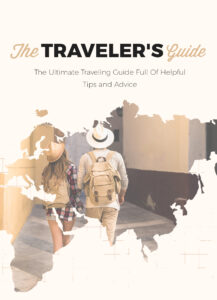How to Save Money While Traveling Abroad

Before diving in, please note: This post is for informational purposes only. If you’d like to know more about how we approach topics, feel free to check out our friendly Disclaimer Page.
Hey there, amazing readers! 🖐️ Just a quick note: yes, we know there are a lot of ads here. Trust us, we get it—it’s not the prettiest look, but they help us keep this blog alive and kicking. Those pesky little ads cover the costs of all the behind-the-scenes magic, from hosting and tech stuff to creating content we hope you’ll love.
We’re committed to delivering quality posts, and your support (even just sticking around despite the ads) means everything to us. So, bear with us, and thanks for helping us keep the good vibes rolling. Now, on to the fun stuff! 😉
TRANSLATE BUTTON AT THE END OF THE ARTICLE
Traveling abroad is one of life’s greatest joys, but it can also be expensive.
From flights to accommodations, food, and activities, the costs can quickly add up.
However, with some thoughtful planning and smart strategies, it’s possible to save money while still enjoying everything a destination has to offer.
Whether you’re planning a quick getaway or an extended journey, these tips will help you stretch your budget further without sacrificing the quality of your experience.
1. Book Flights at the Right Time
Why It Matters
One of the biggest expenses when traveling abroad is usually the flight.
However, the timing of when you book your ticket can make a significant difference in the price you pay.
When to Book: Ideally, you should book your flight 6-8 weeks in advance for domestic flights and up to 3-5 months for international travel.
Flying mid-week, especially on Tuesdays and Wednesdays, can often help you find cheaper flights, as demand is generally lower.
Flexible Dates: If you have flexible travel dates, use fare comparison tools like Google Flights, Skyscanner, or Momondo to explore the best deals.
These tools allow you to compare prices over a range of dates, helping you find the cheapest options.
Red-Eye Flights: Consider booking overnight or “red-eye” flights.
These flights tend to be cheaper, and while they may require a bit of adjustment for your body, they can save you a lot of money.
2. Stay in Alternative Accommodations
Why It Works
Hotels can be expensive, especially in popular tourist destinations.
To save money, consider alternative accommodations that are just as comfortable but much more affordable.
Hostels: Not just for backpackers, many hostels offer private rooms with shared amenities at a fraction of the cost of hotels.
Plus, you’ll have the opportunity to meet other travelers.
Vacation Rentals: Websites like Airbnb or Vrbo can offer budget-friendly options like renting a room or an entire apartment.
Not only do you save money, but you also get the experience of living like a local.
Guesthouses and Inns: In many countries, guesthouses or local inns can provide clean, comfortable accommodations at a lower price than chain hotels.
These types of places often give you a more personal and intimate experience.
Couchsurfing: If you’re really looking to save, try Couchsurfing.
This free platform allows you to stay with locals who offer their couch or spare room to travelers.
It’s a great way to save money and connect with people from around the world.
3. Cook Your Own Meals
Why It’s Effective
Eating out for every meal can be one of the biggest drains on your travel budget.
While it’s tempting to indulge in every local food experience, cooking your own meals can save you a lot of money.
Supermarkets and Local Markets: Visit local grocery stores or markets for fresh ingredients.
Many international destinations have vibrant street markets where you can buy local fruits, snacks, and even prepared meals at a fraction of the cost of restaurants.
Hostel Kitchens or Vacation Rentals: If you’re staying in a hostel or vacation rental, take advantage of the kitchen facilities.
Even if you don’t feel like cooking a full meal, simple dishes like pasta, sandwiches, or salads can help reduce your food costs.
Picnics: Pack a picnic for sightseeing days.
Not only will it save you money, but it’s a great way to enjoy a meal while taking in beautiful views.
Discover "The Traveler’s Guide: Your Ultimate Companion for Every Adventure ✈️"

4. Use Public Transportation
Why It’s Smart
Taxis and ride-sharing services like Uber can be expensive, especially when traveling in large cities.
To save money, opt for public transportation whenever possible.
Subways and Buses: Most cities around the world have affordable and efficient public transportation systems.
A day pass or multi-ride tickets often offer savings over single fares.
Trains: In Europe, Japan, and many other countries, trains can be an affordable and scenic way to travel between cities.
Look for discount passes for tourists, such as the Eurail Pass or Japan Rail Pass, to make long-distance travel more economical.
Walking and Biking: Don’t underestimate the power of walking or renting a bike to explore.
It’s a healthy and inexpensive way to see a city, especially when the attractions are within a short distance.
5. Travel During Off-Peak Times
Why It Helps
Traveling during peak seasons means higher prices for everything, from flights to accommodations to attractions.
If you’re looking to save, consider traveling during the off-peak or shoulder seasons.
Off-Peak Travel: Traveling during the off-season (such as spring or fall for many destinations) allows you to avoid crowded tourist spots, get better deals on flights and hotels, and enjoy a more relaxed atmosphere.
Weather Considerations: While some destinations may be less popular during certain times due to weather (e.g., the rainy season in Southeast Asia), you might find that the trade-offs are worth it for cheaper prices and fewer tourists.
6. Avoid Tourist Traps
Why It Saves Money
Tourist hotspots often come with inflated prices, whether for food, souvenirs, or activities.
To avoid overspending, look for authentic local experiences instead of the usual tourist traps.
Eat Like a Local: Research restaurants and eateries that locals frequent, instead of dining in areas aimed at tourists.
Local markets, small family-owned restaurants, or hidden gems often serve delicious meals at a fraction of the price.
Free and Low-Cost Attractions: Many cities have free or inexpensive attractions, such as museums with no entrance fee, parks, beaches, and free walking tours.
Look into the city’s calendar for free events, festivals, or exhibitions during your stay.
7. Travel Insurance and Health Savings
Why It’s Important
While it may seem like an unnecessary expense, travel insurance can actually save you money in the long run.
Medical expenses abroad can be hefty, and if you have to cancel your trip for any reason, insurance will protect you financially.
Medical Coverage: Check that your travel insurance covers health emergencies, as medical treatment in some countries can be expensive without insurance.
Baggage and Cancellations: Insurance can also cover lost baggage or trip cancellations, saving you from additional costs in the event of unforeseen circumstances.
Prescription Medications: If you take medication, buy a few months’ worth before you leave, as medications abroad can be more expensive.
8. Use Local SIM Cards or Wi-Fi
Why It’s Cost-Effective
Roaming charges for international data and calls can skyrocket, so it’s a good idea to look for ways to stay connected without breaking the bank.
Local SIM Cards: Purchase a local SIM card in the country you’re visiting.
This can give you affordable data and calls, especially if you’re planning to stay for a longer period.
Wi-Fi Hotspots: Many cafes, restaurants, and public spaces offer free Wi-Fi.
Download offline maps and apps ahead of time to minimize data usage, and only rely on Wi-Fi when you can.
9. Set a Daily Budget and Track Your Spending
Why It Helps
It’s easy to get carried away with impulse purchases while traveling.
Setting a daily budget and sticking to it can help keep your spending in check.
Daily Spending Limit: Estimate how much you want to spend each day, including food, transportation, and activities.
Keep track of your expenses using an app or a simple notebook to avoid overspending.
Prioritize Your Spending: Identify what’s most important to you (whether it’s unique experiences, food, or activities) and allocate your budget accordingly.
10. Travel with a Group or Partner
Why It’s Beneficial
Traveling with others can significantly reduce costs, especially when it comes to accommodation and transportation.
Shared Costs: If you’re traveling with a group or a partner, you can split the costs of accommodations (like a vacation rental) and transportation (like car rentals or taxis).
Group Discounts: Many attractions and tours offer discounts for groups, which can be an excellent way to save.
Conclusion
Traveling abroad doesn’t have to mean breaking the bank.
With a bit of planning, research, and flexibility, you can make the most of your adventure without spending a fortune.
From booking flights in advance to staying in budget accommodations and eating like a local, there are plenty of ways to keep your expenses in check while still experiencing all the amazing things the world has to offer.
So, go ahead—start planning your dream trip and make it an affordable reality!

The Enlightenment Journey is a remarkable collection of writings authored by a distinguished group of experts in the fields of spirituality, new age, and esoteric knowledge.
This anthology features a diverse assembly of well-experienced authors who bring their profound insights and credible perspectives to the forefront.
Each contributor possesses a wealth of knowledge and wisdom, making them authorities in their respective domains.
Together, they offer readers a transformative journey into the realms of spiritual growth, self-discovery, and esoteric enlightenment.
The Enlightenment Journey is a testament to the collective expertise of these luminaries, providing readers with a rich tapestry of ideas and information to illuminate their spiritual path.
Our Diverse Expertise 🌟
While our primary focus is on spirituality and esotericism, we are equally passionate about exploring a wide range of other topics and niches 🌍📚. Our experienced team is dedicated to delivering high-quality, informative content across various subjects ✨.
To ensure we provide the most accurate and valuable insights, we collaborate with trusted experts in their respective domains 🧑🏫👩🏫. This allows us to offer well-rounded perspectives and knowledge to our readers.
Our blog originally focused on spirituality and metaphysics, but we’ve since expanded to cover a wide range of niches. Don’t worry—we continue to publish a lot of articles on spirituality! Frequently visit our blog to explore our diverse content and stay tuned for more insightful reads.





